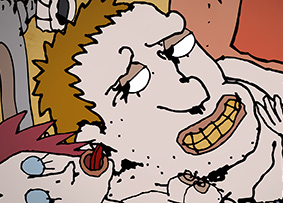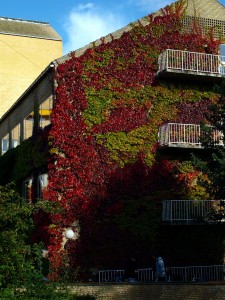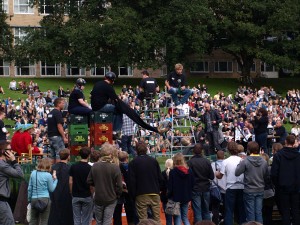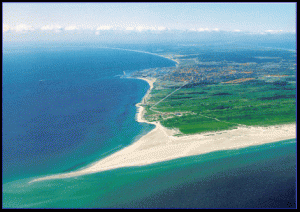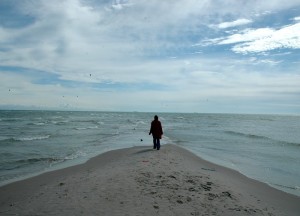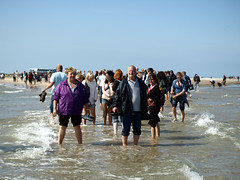Τις τελευταίες εβδομάδες ξυπνάω νωρίς και πάω για ύπνο σχετικά νωρίς. Μπορώ να πω ότι η ολοκληρωτική αλλαγή στον βιορυθμό μου είχε θετικές επιδράσεις στην διάθεση μου. Το προτείνω ανεπιφύλακτα σε όλους τους ξενύχτιδες. (τώρα ξυπνάω την ίδια ώρα που πριν 4 μήνες έπεφτα για ύπνο).
Το φθινόπωρο έχει μπει για τα καλά. Είναι 8:30 και ο ήλιος δεν έχει ανατείλει ακόμα. Όπως κάνω κάθε πρωί, ανοίγω το πισί πρώτο και διαβάζω τα νέα της ημέρας. Αυτό έκανα και σήμερα. Διάβασα τα μεγάλα νέα της ημέρας. Αποφάσισα πως ήταν ώρα για πρωινό. Συνήθως τρώω γιαούρτι (το πολύ υγρό, που είναι στην συσκευασία του γάλατος, είτε με γεύση μπανάνα/αχλάδι, είτε με φρούτα του δάσους — κοινώς αποδεκτά ως φράουλα και βατόμουρο — είτε με γεύση πορτοκάλι) με μούσλι, όμως το γιαούρτι μου τέλειωσε χτες. Πάω στην κουζίνα να μου φτιάξω ένα σάντουιτς.
Ανοίγοντας την πόρτα και βγαίνοντας στο κοινόχρηστο σαλόνι, ανοίγει την πόρτα και ο τυπάς από το δωμάτιο νο. 5, ένας από τους έξι Δανούς που μένουν στο κτίριο (οι υπόλοιποι έξι εκ των δώδεκα είναι ένας Έλληνας — εγώ –, ένας Βόσνιος, μια Ιαπωνέζα, ένας Ισπανός, μια Ουγγαρέζα και ένας τυπάς αγνώστου υπηκοότητας, μάλλον Ιταλός, ο οποίος φοράει καρέ παντελόνια, μαγειρεύει κάτι περίεργα πράγματα και παίζει Νeed for Speed και ακούει Red Hot Chili Peppers στον κοινόχρηστο χώρο). , ευτυχώς όχι ο πραγματικά εκνευριστικός, σχεδόν επικίνδυνος ούγκανος γορίλλας που μόνο από το όνομα καταλαβαίνεις ότι είναι Δανός, τρέφεται με πρωτείνες της συσκευασίας απορρυπαντικού και κάνει πουσ-απς στο σαλόνι βαρώντας παλαμάκια. Δεν ήταν αυτός που ξύπνησε την ίδια ώρα με μένα, ήταν ο άλλος, ο πιο συγκρατημένος, αυτός με την μηχανή έξω στην είσοδο, αυτός ο οποίος συνήθως παίρνει τον ρόλο του διαμεσολαβητή και μεταφραστή για τις άναρθρες κραυγές του γορίλλα που θυμίζουν Δανέζικα (κάποιοι θα υποστήριζαν με ζήλο ότι τα Δανέζικα ήδη δεν απέχουν και πολύ από άναρθρες κραυγές) όταν έχει εκνευριστεί που η κουζίνα δεν είναι στην εντέλεια της καθαριότητας και σπάει τοστιέρες πετώντας τις στο πάτωμα επειδή “ξανά, κανείς δεν πέταξε τα σκουπίδια”.
Μετά τις καλημέρες στις οποίες συνήθως περιορίζεται η επικοινωνία μας, έσπασε την αναμενόμενη σιωπή σήμερα λέγοντας «Η Ευρωπαική Ένωση σήμερα έσωσε την χώρα σου, τώρα δεν πρέπει να πληρώσετε όλα σας τα χρέη». Τον κοίταξα και με έναν αναστεναγμό του απάντησα: «το ξέρω, μόλις το διάβασα» και πήρα τον δρόμο για την κουζίνα, θέλοντας να δείξω ότι θα προτιμούσα να μην μιλήσω για το συγκεκριμένο θέμα. Εκείνος συνέχισε, με ένα ύφος λες και εγώ προσωπικά έφταιγα για το χρέος: «Τώρα ελπίζω τα πράγματα να μην ξανακυλίσουν. Η Άνγκελα Μέρκελ είπε επίσης ότι άλλες χώρες από την ανατολική Ευρώπη θα πρέπει να πάρουν τις ευθύνες τους στα σοβαρά . Αυτό πρέπει να γίνει αν θέλουμε η ΕΕ να πετύχει και να μην χρειαστεί η Γερμανία να τις βοηθάει όλες να κάνουν ό,τι θα έπρεπε να έχουν την σοβαρότητα να κάνουν μόνες τους!»
«Δεν είναι βοήθεια αυτό. Το χρέος μας θα διπλασιαστεί μέσα σε λίγα χρόνια. Το κούρεμα είναι απλά ένα τέχνασμα των μέσων για να μην πουν στα ίσια ότι είναι χρεωκοπία και πλήρης παραχώρηση των εξουσιαστικών δικαιωμάτων».
«Δεν ξέρω, τι άλλο θα έπρεπε να έχουν κάνει;»
Θα μπορούσα να έχω πει πολλά πράγματα εκείνη την στιγμή. Πολλά πέρασαν από το μυαλό μου. Αλλά απλά είπα ένα
δεν έχω ιδέα.



